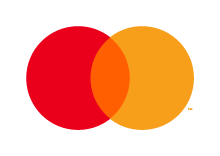Featured guests
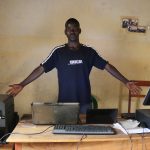
Zachary spent 5 years as a child soldier for an armed militia in the DRC – aged 13 to 18. Alongside other young people who had left the armed groups he underwent training organised by local NGOs, UNDP and UNICEF. WFP ensured that he was fed while at the National Institute for Professional Training (Institut National de Formation Professionnelle: INPP). Now he has started a business using the computer and printer he was given as part of the training. He writes resumes and letters on Word, makes PowerPoint presentations and downloads movies and music for the people of his village and hopes one day to be a computer engineer. Since returning, he has dissuaded more young people from joining armed groups as he did.
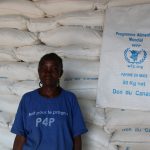
Rosette Kasereka is a farmer in the North Kivu province of the DRC. She was displaced from her home for many years and was unable to farm. Since being able to return to her home she has participated in WFP and FAO’s resilience-building project known as “Purchase for Progress”, or P4P. The project helps farmers increase output and improve access to markets. Rosette now manages a warehouse which as a result of P4P is bringing in more produce than ever before. The increased amounts of money this project creates allows the farms to grow and for children to be sent to school. Rosette now passes on what she has learnt from being a part of P4P to other female farmers.
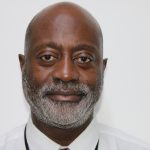
Mr. Claude Jibidar arrived in DR Congo in July 2016, appointed as Representative and Country Director, where he had previously served in different capacity from 1999 to 2002 and from 2006 to 2008. Mr. Jibidar brings more than 25 years of non-profit and corporate leadership experience focusing on food security, nutrition and emergency response strategies. Mr. Jibidar guides a team of about 500 staff members in the Country Office and across 8 Area and field Offices aiming at meeting the immediate food needs of vulnerable Congolese. He had served previously, three years in the same capacity in Kabul Afghanistan, leading a team of more than 550 staff across 6 field offices.

Benjamin Anguandia works for the World Food Programme in the DRC. He has lived in the DRC for all of his life excluding 5 years that he spent in Kenya as a young boy. He studied in the DRC majoring in biochemistry in high school and communications at university. He has experience living and working in insecure environments in the DRC and uses his knowledge in areas such as health and food security to help communities.

Tara Nathan is Executive Vice President for the Humanitarian & Development sector at Mastercard. In this role, she leads the company’s strategy to develop and scale products & solutions for the Base of the Pyramid. The Humanitarian & Development team is dedicated to creating an ecosystem that streamlines access to education, health, commerce, and other vital services for the most vulnerable communities. Tara’s team is focused on driving commercially sustainable social impact. Before Mastercard, she worked at Mobile Payment Solutions as the chief executive officer leading the innovation and commercial development of the Mastercard Mobile Payments Gateway a platform designed to facilitate mobile payments for consumers around the world. Before joining Mastercard, Ms. Nathan worked in various managerial positions at Citigroup’s retail banking business and was a diplomat in the U.S. Foreign Service working in Taiwan, Japan and China. She earned a BSFS from the Georgetown School of Foreign Service and an MBA from The Wharton School of Business.
Transcript
Claude Jibidar: 00:05 If people in the DRC cannot plant because they are driven away from the field that don’t have what they need to feed themselves every day.
Rosette: 00:19 (Native Language) When there is war, everything is destroyed. No school for the children and no food.
Claude Jibidar: 00:27 Surviving sometimes means being on the side of those who hold the guns.
Zachary: 00:36 (Native Language) Life was very difficult to surviving, getting food and that’s when I ended up joining an armed group.
Claude Jibidar: 00:44 If an end is brought to the conflict, I’ll be ready to go back to DRC in a few years’ time. Not to be distributing food, but to be buying food from the DRC.
Claudia Edelman: 01:05 This is the Global GoalsCast, the podcast that shows how we can change the world
Edie Lush: 01:11 In this episode – famine and how to end it. 100 million women, men and children are going to bed tonight dangerously underfed, but the solution isn’t just delivering food, it’s making peace.
Claudia Edelman: 01:25 This podcast is all about making progress and celebrating champions, but we also shine a light on issues that might either derail the progress or on connections that are harder to see. In a moment, we will hear about the connection between conflict and extreme hunger and the new approach by humanitarian agencies.
Edie Lush: 01:46 But first, this word about our sponsors.
Michelle: 01:51 This episode is sponsored by Mastercard. Stay with us later for an interview with Tara Nathan, Executive Vice President of humanitarian development at Mastercard, who will tell us about the digital aid network Mastercard is helping to build and our thanks to CBS New Digital and to Harmon, the official sound of Global GoalsCast.
Edie Lush: 02:18 Welcome back to the Global GoalsCast. I am Edie Lush.
Claudia Edelman: 02:21 And I am Claudia Romo Edelman. Edie, we talk a lot about how sustainable development goals are connected and interconnected. How one goal, say, educating girls helps achieve other goals like ending extreme poverty.
Edie Lush: 02:38 Exactamente, Claudia, and in this episode we’re going to explore a vivid and brutal example of this connection. Goal number two is “Zero Hunger” by 2030. Goal 16 calls for “Peace and Strong Institutions”. What humanitarian agencies say is that we will never achieve zero hunger without major strides towards resolving conflicts.
Claudia Edelman: 03:01 Let us share some basic facts. The World Food Program says that about 113 million people are suffering acute hunger in 53 countries. These are people at risk of starvation in places like Yemen, Afghanistan and parts of Africa.
Edie Lush: 03:20 The problem in the majority of these severe situations is not a lack of food, it’s war and conflict that prevents the growing of food or it’s delivery
Claudia Edelman: 03:29 Or both.
Edie Lush: 03:30 Right? Exactly. So the lasting solution isn’t dropping burlap bags of food from cargo planes. It’s healing the conflicts.
Claudia Edelman: 03:37 Correct. And the World Food Program says that one of the most severe examples of this challenge is the Democratic Republic of Congo, the second largest country in Africa, which is what you explore with them. And the Democratic Republic of Congo, Edie, as you know, holds a very special place in my heart. It was the first ever campaign I launched
Edie Lush: 04:01 And we are going to talk about that at the end of the show. So you, the dear listener, have to hang on for that. So the World Food Program says 13 million people suffer acute hunger in the Democratic Republic of Congo and millions more are at risk. The country has been torn apart by violence and millions of people have been displaced from their land. So in this very fertile country, they can’t grow enough food for themselves and it is often very hard to get food to them. To understand the situation, I spoke with three people in the DRC. The first was Claude Jibidar who directs the efforts of the World Food Program in the DRC. And to help tell the story, he introduced me to two local colleagues. One is Rosette Kasereka, a farmer who had been driven from her land. And the other is a young man we call Zachary, a former child soldier. We’ll hear more from them through a World Food Programme translator. I’ll tell you more about him later.
Claudia Edelman: 05:00 Claude Jibidar has been with the World Food Program for 25 years. As a fact, World Food Programme, WFP, Edie, what do you say? We actually start a lexicon in this podcast and we started introducing jargons and abbreviations that people should know about. So Claude has been with the World Food Programme, WFP, for 25 years.
Edie Lush: 05:22 Okay. I will allow that jargon.
Claudia Edelman: 05:23 He worked in the DRC in his younger days and then return in 2016 after a tour in Afghanistan as conditions in the DRC were worsening.
Claude Jibidar: 05:36 The DRC is part of my daily concerns, worries. It’s what keeps me awake at night because DRC is one of those countries. Where everything should be in place for people to have more than enough to eat.
Rosette: 06:00 (Native language) The farming, we do is in a very difficult context because since 1994, the war has been um, making access difficult to our farms.
Claude Jibidar: 06:13 If people in the DRC cannot plant because they are uprooted because they are driven away from the field they don’t have what they need to feed themselves every day, they don’t have what it needs to take a sick child to health center or take a child to school. That’s the bottom line. If people don’t cultivate in DRC they don’t eat. The one important factor, if I was to pin only one in the DRC, I would say conflict. And what it means is that a family, a woman, her children, the husband in the middle of the night anytime suddenly they have to run and that run and leave everything behind.
Rosette: 07:08 (Native language) It was one of the groups called, CNDP that attacked the regular army. It was heated up badly that the army had to flee. And in that period there were many people that lost their lives. And in that period we had to run away. We had to flee from that (native language) and at that time we fled with my four children and with my husband and uh, my mother.
Claude Jibidar: 07:42 So Rosette is one of those extraordinary women in the DRC. You cannot imagine what they go through.
Rosette: 07:55 (Native language) And so when you talk about when there’s war, everything is destroyed. No school for the children and no food. We all slept, at one little room and food was very difficult to find.
Edie Lush: 08:12 It would be simple, or perhaps I should say, simplistic to think of all of this as good farmers who driven from their land by evil soldiers. Claude explained to me that often is not the soldiers themselves were caught up in the cycle of hunger and conflict. The perpetrators are victims, too.
Claude Jibidar: 08:30 In many instances you are talking of a handful of young guys from a village trying to survive. And what do they do to survive? They try to have access to resources either by taking it from whoever may provide them something: a bag of maize, a cow, a goat from the villages simply because those young people are armed. In other circumstances, maybe much better organized groups, some of them manipulated, some of them even set up to access and control resources and they get something out of it…so it’s all about survival.
Zachary: 09:21 (Native language) I had to stop school suddenly because of the conflict of war that had just started. My parents were being disturbed when they were going to farm and that led to me stopping school.
Edie Lush: 09:41 We call him Zachary. The World Food Program asked us to withhold his real name to protect him from reprisals by the armed group that he used to run with. He was 13 when he joined the militia.
Zachary: 09:56 (Native language) Life was very difficult surviving, getting food and I started having ideas and that’s when I ended up joining an armed the group.
Claude Jibidar: 10:08 You realize that uh, they did go through some terrible times. These were people who are trying to survive
Zachary: 10:19 (Native language) Once I joined the armed group, life was even more difficult than I had thought before, because it was very, very, very difficult to eat and once we would fight every time and not eat anything. And when you left as a group to go out somewhere to fight, you’d leave with a number of ten, and you come back three people and there was even no medicine – we just lived like that.
Claude Jibidar: 10:53 Surviving sometimes means being on the side of those who hold the guns rather than being the victims of those people. Survival is also about, you know, making sure that you can have access to those resources yourself.
Zachary: 11:09 (Native language) Our food we used to get it from the farmers, we would go in people’s farm and take things. We would do looting most of the times and I would stop cars on the road, take what we want, also some money. (Native language) Yeah that’s how we got our food.
Claude Jibidar: 11:30 And that goes on until a time when somebody can come and give you alternatives, give you options. And Zachary, like many others– they had this opportunity to be given options. And um, through those options, you know, change the way they were looking at the future. These are people, if you talk to them, you’ll see that what they want is they want education, they want security, they want to grow up and have their own families care for their own families. I mean things that are as simple you and I, we, we enjoy every day just a bit of peace.
Claude Jibidar: 12:17 There is more than enough to feed everybody. I don’t think that is the point. The point is about a number of people in a number of specific countries and contexts, face challenges that are beyond what they can manage themselves. And that is where I believe, you know, agencies like the World Food Program and all the others really have to come together.
Claudia Edelman: 12:54 In 2016 the world’s humanitarian organizations came together at a very important meeting in Istanbul. I happened to be there and they agreed on this new approach of not just delivering food, but also solving the problems that caused hunger in the first place. Istanbul was massive, a crucial meeting of the minds where leaders agreed for the first time to work on prevention and also work on issues at the same time. Everything is interconnected.
Edie Lush: 13:27 There’s a new phrase for this thinking humanitarian agencies should move from delivering aid to ending need, and I asked Claude about that. So it sounds like peacemaking is the ultimate skill you need to make sure that people can just eat. How do you address that? Do you and your colleagues have the skills you need? Do you fund people who do, how does it work?
Claude Jibidar: 13:52 We call on everybody. We call on people like you. I call on first and foremost on the government to play its role to ensure that its people can have some stability. We try from our own side to stabilize communities. Let me give you an example. One of the conflicts currently hitting that Tanganyika province of the DRC is a conflict between what we call the Tua, which are the peak big community against the Bamtu community. These two communities have been at war fighting each other, killing each other, creating displacement. So what we, WFP, have tried to do jointly with FAO, with other NGO partners like “Search for Common Ground” is to bring these people together and have them work side by side, have them see what advantages they can obtain from this collaboration, what it brings them as opposed to, you know, the conflict that they were pursuing.
Claude Jibidar: 15:19 And if you go to a place called Caballo, you have today through a resilience project being implemented by the World Food Program, FAO, and “Search for Common Ground”, with the support of a number of donors, you have these communities working side by side, they reap the benefit of pooling their resources, their capacities together. This is something that I wish I could scale up and multiplied by 100 because you know what hunger drinks about conflict and conflict generates hunger so it’s a vicious circle. It has to be broken.
Claudia Edelman: 15:59 The scale of the challenge is quite large. With families living in terrible conditions and unable to farm or feed themselves.
Claude Jibidar: 16:09 The new numbers was more than 4.5 million people displaced internally. Being internally displaced in Kasai meant that people had left their homes and for a year, for some of them, people have been surviving in the bush, and when I say surviving in the bush, it means feeding off whatever you could find in the Bush sleeping, wherever you could sleep.
Edie Lush: 16:40 We rejoin rosette that after she and her family returned home, unlike so many who lose children to hunger or illness – or even snakebites – while displaced from their homes, she has all of her family intact.
Rosette: 16:56 (Native language) When we got back, it was very difficult depending on assistance. Everybody was trying to farm in their own different ways. Seeds were difficult to find before that. Until when WFP, the World Food Program and Food and Agriculture Organization came in to support us with the trainings on how to farm and, uh, increase our produce and also provided us seeds and tools.
Edie Lush: 17:29 And so now what are you growing Rosette?
Rosette: 17:34 (Native language) We farm maize, beans, cabbages, eggplants. (Native language) I am able to plant for selling and also eating some in the family and also I’m managing to, to have some money selling my products to pay for basic services and most importantly, uh, the children’s school fees.
Claude Jibidar: 18:05 WFP, FAO helps them, provide them with a bit of food, provide them with a bit of seeds, a few tools and two months after you see Rosette and you see other women chanting, dancing because they have had their first harvest. And that’s one of the stories. But it is the story of I would say all the women that we are meeting in the DRC and that’s why for us it is so important to be behind these people, to support them, to listen to what they want, what they need and do our utmost to be able to bring them because what we are bringing is very little and what they’re fighting, what they’re struggling is so much more, so much more than what we can bring them. That’s why I think the story, the history of the DRC, you know, if this country becomes what it is meant to be, I think it will be thanks to the women of the DRC.
Claudia Edelman: 19:12 As she was rebuilding her own life, Rosette was able to take on a leadership role in a farmer’s group that is part of their resilience building encouraged by the World Food Program. It is called purchase for progress and it helps farmers build their markets and income.
Rosette: 19:32 (Native language) I’m the president of the 11 farmer’s organization. It is very important as the project came because here in our area it’s very difficult for women to be in positions to make decisions. It was always the manner that makes the decision even in the homes, but now I’m part of the team. I am now making, able to make, decision and it makes me very happy. Through this project I have also learnt personally that uh, farming is a, is a very good business. It’s a business because it has enabled me to learn the value of what I produce. I know that food is very important and there is a portion I can keep, I can store for eating and a portion I can sell and it has increased my income in my house. Here, there’s a common saying that says union is power. And through this project, purchase for progress, we have become one. It has brought us together in this conflict situation that we lived before. If I’m in a difficult situation, I know I can go to another person within the group because now we know each other better. I found where I belong. I know that with farming I plan my life better. I know what I produce, my income is and that’s how I live. (Native language)
Claudia Edelman: 21:12 When we come back, we will hear why Zachary decided to lay down his guns and give up being a child soldier. At first, another cool woman from mastercard, Tara Nathan, executive vice president in charge of humanitarian development. Claudi. We met her in Davos, remember indeed, and I spoke to her about the digital aid network. Mastercard is helping to build.
Tara Nathan: 21:37 We see that while philanthropy has a critical role to play, we believe that our technology and our capabilities and leveraging our knowledge of not just digital technologies but of building payments, ecosystems can really have transformational impact. Specific examples, we partnered with a number of different NGOs, the likes of Mercy Corps and Save the Children, World Vision, et cetera, to build something called the Mastercard Aid Network.
Tara Nathan: 22:08 What the Mastercard Aid Network was, was a digital wallet that enabled a beneficiary who was sitting in a remote place, whether in Yemen, in a disconnected environment with no mobile phone coverage, with no power, no electricity, the ability to receive digitally their food and their humanitarians benefits. What this does is because they’re receiving it digitally, it gives that beneficiary the ability to redeem at a local marketplace just like you or I would. It enables them to redeem their benefits for fresh fruits and fresh vegetables and to actually make healthy choices for their families. The other side of that really is what it does for the organizations that service and that serve these beneficiaries, like the NGOs who we partner with.
Tara Nathan: 23:00 And that is it gives them a more cost effective way, a more auditable, a more transparent way to provide these benefits. We look at our digital infrastructure as sort of digital roads that that give access to a number of different services and we have another solution that we are deploying currently across Uganda and Kenya and in India as well, which is giving, for example, smallholder farmers access to Agri buyers. So a small holder farmer typically in a rural environment would be limited as to where they could sell their goods. So their household income will be limited by who comes to their, literally who comes to their farm gate and purchases what their wares are.
Tara Nathan: 23:46 By digitally enabling these smallholder farmers, we give them access to large scale Agri buyers who can now pay much more for their produce or for their beans or for their crops. And eliminate some of the middle men who sit and extract rents in these value chains. We now either eliminate some of that and or create transparency.
Claudia Edelman: 24:10 More from Mastercard and Tara Nathan later. Now let’s return to our conversation about how conflict and famine are tied together. And no one illustrates that better than Zachary who talks about the terror of being a child soldier.
Zachary: 24:32 (Native language) I decided to leave during one mission whereby we, we went to fight and uh, we went 15 and came back seven people. Three of my friends got killed that day and I thought to myself, why should I continue living like this? And uh, if there’s no other life than this, that was when I decided to go and leave the group.
Edie Lush: 25:02 He would have been killed if he’d asked to leave. He fled in the night, made it home, but then had to go into hiding from the very militias that he’d run away from
Claudia Edelman: 25:12 And here is where the coordinated humanitarian efforts to end need gave Zachary a new start. He joined the training program run by a local NGO, focused on rehabilitating former child soldiers. The WFP made sure he was fed while he was learning how to start a new business.
Rosette: 25:37 (Native language) I got registered for the program and they took us to a place where they would train us and they ask us what we wanted to learn. As me, I was passionate about computer science and uh, that’s what I chose to be trained in. (Native language) The place where the educational center was located, was a two hours of walk from where I lived, from my village, my home. I had to wake up very early in the morning around five o’clock to be there at eight o’clock. It was very difficult in the beginning. I was motivated and encouraged through the food that uh World Food Programme was giving out to the former ex soldiers participating, taking part in that training that motivated me, encouraged me to continue and finish the training.
Edie Lush: 26:36 After the training and with the ‘exit kit’- that’s a computer and a printer provided by the program, he was able to open his own business providing printing, scanning, word processing and more.
Zachary: 26:50 (Native language) I opened the place and I make some money out of it. (Native language) With a place I’ve opened I’m also providing training, showing some youth that are interested in computers and computer sciences. And also through that I’ve been able to sensitize former armed group people that were still in there. I talked to them and sensitized them out of it to get out.
Claudia Edelman: 27:21 He also used his experience to discourage other young people thinking of joining an armed group. He had succeeded with seven people who were about to join the militia.
Zachary: 27:34 (Native language) I see myself as a peacemaker and the more knowledge I get, the more I’ll have the ability to help out as many people as possible. (Native language) I dream of a place where we are able to do live free of children going into armed groups like the way I did.
Claudia Edelman: 28:03 Don’t just deliver aid, end the need. We can really see that in the stories of Rosette and Zachary. She has learned to manage and grow an agribusiness and he’s a budding tech entrepreneur.
Edie Lush: 28:15 And a big part of his business Claudia is actually helping people download movies and music. He’s like a kind of one man Netflix, but that’s to say nothing of his new found role working to keep young men and women like him out of the armed militias. I was really moved by my conversation with Zachary and also Claude Jibidar. He and the other humanitarian leaders know what needs to be done in the DRC. If peace and stability can be created, the experts say the DRC has the abundance to produce enough food to feed everyone in Africa, with food left over.
Claude Jibidar: 28:53 I always say as a joke that in the DRC, when you take your tomato, you wash your tomato, you throw the water. You come a month after you have a tomato plant, but it is true. It’s not a joke. I recall back in the 90s we tried to rehabilitate some rail tracks that had not been used for nine months. There were trees, trees had grown in the middle of the tracks. I mean that’s what DRC is about. The potential is there. Everything grows and grows very fast. If an end is brought to the conflict, I would be ready to go back to DRC in a few years’ time. Not to be distributing food, but to be buying food from the DRC and taking that food in a number of other places where they’re hit by drought and by, you know, like Mozambique at the moment with, you know, these floodings because the DRC can feed huge numbers of people. FAO Talks of 2 billion people. This country hosting currently 90 million people, of which at least 20 millions are food insecure. That country could produce enough to feed 2 billion.
Edie Lush: 30:19 Claudia, I don’t know if you’re aware, but we had some behind the scenes drama making this episode. As you can see, conflict is a daily issue in life in the DRC, so it turned out to be a daily issue in recording. Benjamin Anguandia, who was the WFP staff person who also was a translator, was supposed to go interview Rosette and Zachary with me on the other end of the phone and I got a message from his office saying he’s had to turn around because there’s armed militias on the road between his office and where Zachary and Rosette live, so the exact same issues that affect those folks in our episode affected our podcast.
Claudia Edelman: 31:02 I started by telling you Edie when I was working for the UN refugee agency in 2008 no one, I mean no one spoke about the DRC. The focus was in Darfur and in other areas of Africa and the world. But I went out and started measuring and checking media space given to the DRC, how much media was covering it and literally was nothing, was one of the countries that had very little funding and there were 5,000 people killed every day and the number of child soldiers that were in DRC wars, were humongous. So it was almost like the bloodiest place in the world that no one saw. I went out and started knocking doors of different people to try to get some attention to the DRC. So the first door I knocked was Universal Studios. I said, I need you guys to come to the DRC and film something so that we can bring this issue to the table.
Claudia Edelman: 32:00 You can only imagine their faces. When I said that, and they were like, what’s the DRC? But beyond that they committed to actually doing that. And we went afterwards to try to get a soundtrack so that we could do something. So the Rolling Stones donated “Gimme Shelter” and then we went out to Ben Affleck to see whether he could actually direct this video to try to incentivize people to give shelter, to actually understand the DRC was a tragedy that needed to be seen and needed to be corrected. Knowing how much potential DRC had. You can only imagine the amount of times that we tried to take off with the little planes full of equipment trying to land in the DRC was not possible. So I thank everybody for having made that effort and it brought the DRC from the invisible to the visible to some degree.
Edie Lush: 32:49 What did you learn from that?
Claudia Edelman: 32:51 DRC is a place that illustrates that you have to work together on so many fronts at the same time and you know like it’s not that you can work towards education and forget about gender and you have to work on everything at the same time and it’s such a potential land. People understanding leaders, understanding that in order to really accomplish ambitious goals, you have to work on many things at the same time and pretty much work on prevention, but Edie, pretty much what the sustainable development goals or SDGs are. There we go, lexicon number five,
Edie Lush: 33:27 Another bit of jargon.
Claudia Edelman: 33:27 There we go.
Edie Lush: 33:28 Can I, before we move on, I just want to say the next time you go to knock on the door of Ben Affleck and the Rolling Stones I could come to, I can also knock on doors.
Claudia Edelman: 33:38 But Edie, these stories, the stories that we’re telling today, they illustrate hope and how champions are really making a difference and how it is possible to get to that path. Particularly now that we have by far more understanding and a framework of action.
Edie Lush: 33:55 And I think that those stories that we told today, the stories of Zachary and Rosette, they are the champions just as much as Claude is. Those are the folks who are helping to rebuild their country even as it’s still under so much threat.
Claudia Edelman: 34:10 Edie, not to brag, but on Saturday I was awarded the Ellis Island Medal of honor. I hope that you saw that and there were like 100 people that were honored and the one that really got the attention of everybody, because there were only a few people speaking, was David Beasley. He’s like the executive director of the World Food Program. And when he was talking I could just see that people got it, but also had hope and they believed on it and actually they could understand it and see because food is something that is concrete and tangible and gets people together. David was also very good in praising the US for stepping up and while in many other areas, you know, like there’s, there’s some questions about whether the US is following, you know, global affairs here. He reassured that this country was actually stepping up and stepping forward. So that was a massive event.
Edie Lush: 35:04 And I would like to praise you for stepping up in such an amazing dress. Not that it’s all about the dress.
Claudia Edelman: 35:11 And the dress is a beautiful bridge to the facts because it’s not only looking great but also looking smart. So here are the three facts for today.
Edie Lush: 35:21 So fact number one, issues of food and nutrition are not only related to agriculture or trade. Conflict plays a huge role and as a fact, conflict is the most serious cause of acute hunger affecting 75 million people and getting worse.
Claudia Edelman: 35:37 Fact number two, one third of the world’s food is wasted and one person in 10 around the world is under nourished.
Edie Lush: 35:45 Fact number three, 29 million people face acute hunger because of climate change. Most of these people are in Africa but also in Pakistan and Haiti. This is likely to increase and spread in the years to come. And in several countries including the DRC conflict and climate change are reinforcing each other. You can learn more at our website, globalgoalscast.org the links to the latest reports on hunger are there to learn more. You owe to yourself and the future. As Claude Jibidar explained,
Claude Jibidar: 36:18 Maybe think the worLd differently, whatever big the world is whatever happens somewhere will affect all of us. If other people are suffering, there will reach out to where they can have safety, where they can have wealth, where they can survive. So let’s help each other because otherwise we will all be the same problem at some point.
Edie Lush: 36:49 Okay, Claudia, we’ve also got some actions. Action number one, Claudia, take out your phone and if you haven’t already, download, Share the Meal, the World Food Programme, oop, the WFPs app. It lets you pick where you want your help to go. So swipe, till you find the one you want to click on and then you can feel good. I did this yesterday and I was tidying up the script and I chose the DRC because the money I give goes directly to the school feeding programs like the one Rosette sells her crops too.
Claudia Edelman: 37:20 So I’m going to correspond to your action with another phone action. Edie, take out your phone, now, download Olio. You got it?
Edie Lush: 37:31 I got it. I did it.
Claudia Edelman: 37:32 There you go. So snap a picture of something you don’t want in your fridge or cupboard and within a day someone in your neighborhood will come and pick it up. How smart is that? Combat food waste and eliminate hunger locally. That’s awesome. Edie did this all last weekend, didn’t you?
Edie Lush: 37:52 I did and I even got rid of my cranberry sauce that I thought no one but Americans would want and why would they want it in London in May and somebody did. That’s what’s amazing.
Claudia Edelman: 38:03 Download Olio guys.
Edie Lush: 38:05 Action number three, support partners of Global GoalsCast- Slow Food, check out their food for change campaign, which explains how our food choices have a direct impact on the future of the planet.
Claudia Edelman: 38:17 And also support Gastromotiva from our friends in Brazil that feed people in underprivileged areas, reduce food waste by cooking it and also empower youth to be more aware and more conscious about their food.
Edie Lush: 38:34 And here’s the Global GoalsCast lexicon.
Claudia Edelman: 38:40 WFP- World Food Programme
Edie Lush: 38:41 DRC- Democratic Republic of Congo
Claudia Edelman: 38:44 SDGs- sustainable development goals
Edie Lush: 38:49 and NGOs. I don’t even know what they are!
Claudia Edelman: 38:50 Ah you got it! Non-governmental organisations
Edie Lush: 38:50 Non-governmental organisations.
Edie Lush: 38:58 Now Let’s hear more from Tara Nathan, executive vice president at Mastercard. Earlier, she introduced us to the way Mastercard is helping people in remote locations to receive aid digitally and how that in turn is promoting better nutrition. Is all of this being done via the mobile phone?
Tara Nathan: 39:18 We find that in a majority of the context where people living at the base in marginalized communities exist, frankly, have no connectivity or have very intermittent connectivity. And so when those types of contexts, what we’re really trying to figure out, and we’re doing a lot of innovation around is how we can create offline solutions. So offline solutions that are facilitated via what looks like a regular Mastercard that you carry around in your wallet. But now what we do is we leverage that chip card to serve, if you will, as an entry level mobile phone almost because it can store data, it can store biometric capabilities. Wouldn’t it be great if someone can show up at a point of interface at a point of sale and just via their biometrics just via who they are, capture their face and receive the goods and services to which they are entitled.
Edie Lush: 40:12 So what do you think the biggest challenges are with the programs that you get involved with that aim to serve marginalized individuals and communities?
Tara Nathan: 40:25 I think the biggest challenge that we face, frankly, is that the various actors across the humanitarian and development sectors still fail to act in concert. So what does that mean? We have very siloed approaches, both from a solution perspective, from a technology perspective, from a go to market perspective. And what that results in is, high cost for donors, it results in unprofitability for the private sector. It results in substandard solutions for the beneficiaries we seek to serve. So that is the main gap. We’ve made an effort to this end in conjunction with about 35 other partners we launched in Davos actually two years ago. The Smart Communities Coalition and the Smart Communities Coalition is really aimed at doing that. Smart Communities Coalition really aims to say, how do we create the digital roads, the power roads, the connectivity roads that create the infrastructure that can provide those longterm solutions. I think these are the types of ecosystem or joint approaches that are really going to be critical if we are going to solve, you know, what has been repeatedly called out is the several trillion dollar funding gap to achieve the the sustainable development goals.
Edie Lush: 41:56 That was Tara Nathan from Mastercard.
Claudia Edelman: 41:59 And that was a wrap. That’s it for this episode of Global GoalsCast. Thank you so much to all our guests. You can find out more on our website, globalgoalscast.org. Please like and subscribe wherever you get your podcasts and follow us on social media at Global GoalsCasts. Goodbye, Edie Lush.
Edie Lush: 42:18 Goodbye, Claudia
Claudia Edelman: 42:23 Bye!
Michelle: 42:23 Music in this episode was by Neil Hale, Andrew Phillips, Angelica Garcia, Simon James, Katie Crone and Aasgeesg Paliwal. Thanks to our translator, Benjamin Aguandia. This episode was made possible with the support of Mastercard, CBS News Digital, and Harmon, the official sound of Global GoalsCast.
